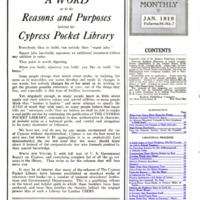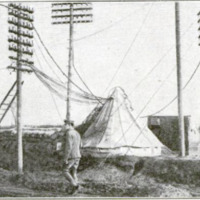The importance of the thelephone line for communication during a war
Item
-
Title (Dublin Core)
-
The importance of the thelephone line for communication during a war
-
Article Title and/or Image Caption (Dublin Core)
-
Hello, Central! Give Me Berlin
-
extracted text (Extract Text)
-
A MODERN army without
telephone service is in
about the same fix as a big
city would be if all the wires
should go dead. It follows that
every effort must be made to
keep the telephone service in
the field attop-notchefficiency,
and therefore daring linemen
and operators follow close at
the heels of the troops.
On the fighting line “‘cen-
tral” is housed far under-
ground or in carefully camou-
flaged shelters; but the larger
stations back of the front are
usually safe from all but
aerial attack, and they set up
their switchboards in the com-
parative comfort of a large
tent or, better still, an aban-
doned house.
In addition to seeing that
messages go to the right
places, the telephone squad
must watch out for breaks
and make quick repairs.
Formerly the squad had to
be on the alert for an enemy
“listening in”; but in the
latter part of the war the
lines were so laid that the use
of spy microphones by which
messages were stolen from the
wire was almost impossible.
The army central’s task,
while made less hazardous by
peace, is none the less strenu-
ous. The title of this article
may literally be lived up to,
for the army centrals will have
a large part in aiding the work
of food distribution among the
starving enemy.
-
Language (Dublin Core)
-
eng
-
Date Issued (Dublin Core)
-
1919-01
-
pages (Bibliographic Ontology)
-
51
-
Rights (Dublin Core)
-
Public domain (Google digitized)
-
References (Dublin Core)
-
Berlin
-
Archived by (Dublin Core)
-
Davide Donà
-
Marco Bortolami (editor)
-
Spatial Coverage (Dublin Core)
-
Europe
 Popular Science Monthly, v. 94, n. 1, 1919
Popular Science Monthly, v. 94, n. 1, 1919
 Screenshot (406).png
Screenshot (406).png
